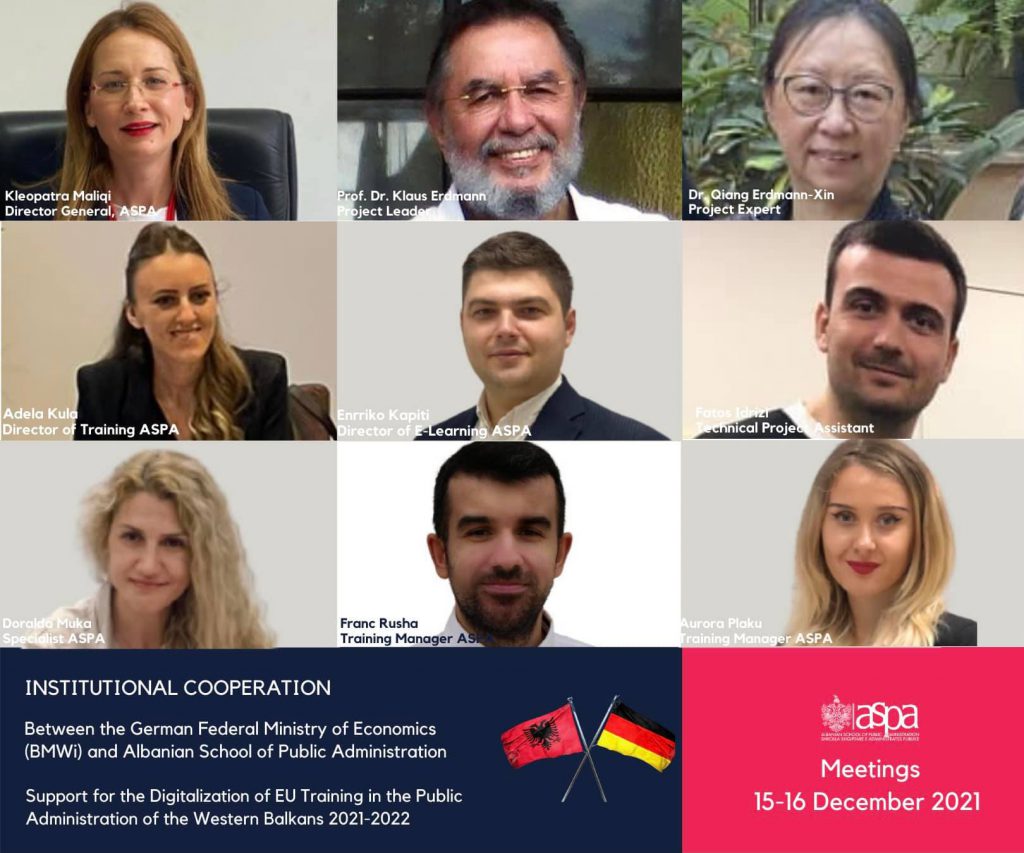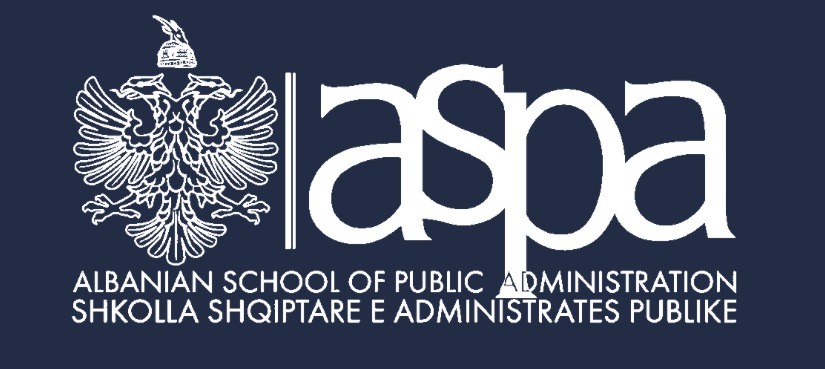🇦🇱🤝 🇩🇪 The Albanian School of Public Administration (ASPA) and the German Federal Ministry for Economic Affairs and Climate Protection (BMWi) have started the institutional talks for signing a joint bilateral cooperation agreement in framework of the multilateral project
“Supporting the Digitization of EU-related Trainings in the Western Balkans Public Administration 2021-2022”.
In the meetings were present these officials:
Prof. Dr. Klaus Erdmann, Project Team Leader: “Support for the Digitalization of EU Training in the Public Administration of the Western Balkans 2021-22”/The Federal Ministry for Economic Affairs and Climate Protection;
Dr. Qiang Erdmann- Xin Project Expert: “Support for the Digitalization of EU Training in the Public Administration of the Western Balkans 2021-22”/The Federal Ministry for Economic Affairs and Climate Protection;
Mr. Fatos Idrizi, Technical Project Assistant/Project: “Support for the Digitalization of EU Training in the Public Administration of the Western Balkans 2021-22”/The Federal Ministry for Economic Affairs and Climate Protection;
Mrs. Kleopatra Maliqi, Director General, Albanian School of Public Administration;
Mrs. Adela Kula, Director, Continues Training Directory, Albanian School of Public Administration;
Mr. Enrriko Kapiti, Director, E-Learning Directory, ASPA, Albanian School of Public Administration;
Mrs. Doralda Muka IT, Albanian School of Public Administration;
Mrs. Aurora Plaku Training Manager, E-Learning Directory, Albanian School of Public Administration;
Mr. Franc Rusha Training Manager, E-Learning Directory, Albanian School of Public Administration.
About Institutional partnerships with the German Federal Ministry for Economic Affairs and Climat Protection (BMWi) – administrative change for more trade and investment
Sharing experience – always a win-win situation Bilateral institutional partnerships are a new tool of
the BMWi to deliver advice on economic policy to authorities in selected partner countries. Employees from the BMWi and other authorities within its portfolio engage in practical cooperation and share expertise with foreign partner authorities in the field of economic policy. Thus, reform processes can be supported and administrative structures modernised. The EU’s Twinning instrument is the role model for the institutional partnerships.
The BMWi’s experts know how fruitful an open dialogue is for both sides, and they are eager to share their expertise with their counterparts from the partner countries. They are familiar with the challenges faced by the partner countries, can draw on many years of experience in administrative reform and are passionate about working together across borders.
Objectives
Smoothly functioning administrations are a vital component of any country’s political and economic environment. As agencies engage directly with individuals and companies, interaction with efficient administrations builds trust in the state, creates stability, and provides a platform for economic success. Sharing Germany’s administrative best practices and providing targeted expertise helps the partner countries to implement lasting reforms. This strengthens the local economy at the same time as fostering trade and investment from German companies in the country. Therefore, the needs of German companies are one of the criteria that are considered by the BMWi when selecting new partnerships.
The key tasks of the institutional partnerships always include:
# establishing and expanding efficient authorities
# helping to adjust and to implement laws, guidelines and procedures
# training of employees from partner institutions
Typical key issues are:
# export and investment promotion
# procurement and competition law
# quality infrastructure
# digitalisation and innovation
# support for small and medium-sized enterprises (SMEs) and start-ups
# economic and industrial policy
# regional economic assistance
# energy markets, energy efficiency, renewable energy
Methods include:
# exchanges of experts, training, conferences and workshops
# training of employees from partner organisations
# study tours to Germany
The dialogue to establish good administrative practice
Steps towards a bilateral institutional partnership:
# The partner authority outlines its need for reform and contacts the BMWi. The BMWi examines
whether the reforms will improve the policy environment for the local businesses and the activities
of German firms in the country.
# The BMWi assesses the level of interest and capacities on the part of the German authorities that are eligible for an institutional partnership.
# The experts of the BMWi and its agencies go on to elaborate a cooperation concept that is tailored to the needs of the partner authority.
The project partners commit themselves to shared goals. If the project is to be successful, it is vital that both partners assume responsibility and perform clear-cut tasks.
# Together, the project partners draw up a declaration of intent that is followed by a ‘rolling work
plan’ as a means of jointly developing and managing the project.
# Ideally, a partnership gives rise to long-standing networks between the cooperating authorities, allowing further reform processes to be effectively fostered. Thus, the institutional relations that have
been established continue to exist once the project has been concluded, and multipliers are created in the partner country.
Each institutional partnership benefits from Germany’s twenty years of Twinning experience, which
is pooled in the National Contact Point (NCP) for Twinning at the BMWi. As in the EU’s Twinning programme, the institutional partnerships network a large number of administrative experts who can draw on a lot of specialist and project-related expertise. The NCP’s expertise is the best way to ensure that the projects go well and work to high standards.
About Albanian School of Public Administration (ASPA):
The Albanian School of Public Administration (ASPA) is a central, public institution responsible for providing obligatory and non-obligatory learning and development services to central government, local government, and independent institutions. Our institution was established in Tirana, in the year 2000, initially organized as the Training Institute of Public Administration (TIPA) and since 2013 as the Albanian School of Public Administration. The purpose of our organization is to support the development of the Albanian Public Administration, ensuring that public employees have the knowledge, skills and experience to fulfil individual and organizational needs. Annually, around 5000 individuals and 17000 participants from public administration bodies participate in our training services.
For more information on recent activities visit:
https://aspa.gov.al
https://www.bmwi.de

